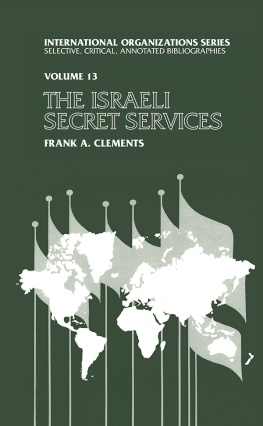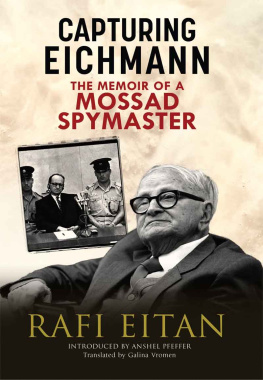

Foreword
T he full story of the passage of thousands of Ethiopian Jews to Sudan and on to Israel has yet to be told. Only when more members of this remarkable community speak will we truly comprehend the trials, difficulties and suffering they endured during their unbelievable journey to Zion, the object of their longing and hopes for hundreds of years.
The extraordinary operation to rescue the Ethiopian Jews from Sudan and transport them to Israel succeeded due to a combination of this steadfast hold of the Ethiopian Jews onto a near-messianic dream, together with the close assistance of the Israel Defense Forces and a very uncharacteristic Mossad mission, thousands of miles away from Israel.
This account is not a historical document but a medley of personal recollections, written with some hesitation for fear of overplaying the roles of some or underplaying the roles of others.
In describing the events I was privileged to be part of, I relied solely on my recollections of experiences from those turbulent days. Naturally, since more than twenty years have elapsed, I have no doubt that some of my colleagues and friends may remember the same events differently or with different emphases. Nevertheless, I am confident that we will agree on one point: our part in the complicated and exciting Mossad operation to rescue the Ethiopian Jews from Sudan was the most extraordinary and emotional period of our lives.
I dedicate this book to the thousands of anonymous heroes of the Beta Yisrael people who overcame suffering and unbearable difficulties to realize their dream of reaching Jerusalem, and to the dozens of Israelis involved in the long and perilous operation to bring the Ethiopian Jews over, giving a new meaning to the term Zionism. Since some of these persons are still serving with the Mossad, Israels Institute for Intelligence and Special Operations, they are referred to in this book by pseudonym only.
Special thanks to Felix Gershoni, for his help and advice.
Gad Shimron
2007
Chapter 1
T he Sudanese television newscaster, who somehow always managed to appear emaciated and exhausted, started reading the final newscast summarizing the events of Sunday, January 6, 1985, in a monotonous voice. A generator clattering in the small courtyard outside made it possible for us to follow the news despite frequent power failures. Its the fifth one today, someone commented angrily. As is customary in Arab countries, the first five minutes were devoted to giving an account of the daily activities of the ruler, General Jaafar Nimeiri. Nimeiri here, Nimeiri there, and not one word about the palpable tension in the streets of Khartoum, the persistent rumors of an impending military coup, and not even a squeak about the hottest story in the international press that week.
Operation Moses is over, I heard the Israeli government announcement through an earphone plugged to a portable radio, which for reasons known only to signal corps experts, was able to pick up, of all things, Kol Israels news programs in Khartoum every evening. The newscasters deep voice gave him away as Zvi Salton, a colleague from my days in Kol Israel, Israels official radio network. He read out the official Israeli government statement, with a quote from Shimon Peres, the prime minister, about Operation Moses, the remarkable rescue of thousands of Ethiopian Jews who were stranded in Sudan.
That night in Khartoum, we didnt know that the citizens of Israel had already seen footage of dark-skinned Jews alighting from jetliners, bewildered by the host of television cameras and glaring spotlights, still not grasping that they had reached their coveted destination.
We, a small group of Mossad agents staying in Khartoum and dealing with the more covert aspect of the rescue operation, were aware of other images: small, overloaded rubber dinghies making their way to an Israel Navy vessel waiting beyond the coral reefs and the horizon, and air force C-130 Hercules transports landing in the middle of the night at an improvised landing strip in the desert, loading up hundreds of famished refugees.
But now, through the earphone, I could only pick up the last chords of Operation Moses, including, as expected, some reaction by politicians, and sharp criticism from those who decried the lifting of the veil of secrecy from the operation, causing it to be suspended the previous day.
Once again, lousy politicians and nosy journalists, someone quipped. You mean again, not just once again, I corrected him with a broad smile, knowing that the friendly taunt was intended mostly for myself.
Its rather strange to be in Khartoum and hear from Israel about the suspension of an operation which only we know is still going on, said the know-it-all technician, who managed to keep our equipment functioning even in the impossible conditions prevailing in Sudan. Youre a journalist yourself, he added, grinning from ear to ear. The day after tomorrow youll sit poker-faced in front of your computer screen at Maariv newspaper, while everyone around you keeps talking about this astounding operation and the courage of the indefatigable Mossad men. Tell me youre not suffering from a split personality, he challenged, still smiling, and even before I had a chance to respond, he launched into a series of complaints about having been ordered to stay behind with our small group to await further instructions.
The following day, at the filthy and derelict Khartoum Airport, on my way back to Europe, after countless luggage checks and poking by jittery police and soldiers, another scene came back to me, from another airport three years earlier...
Then, in the spring of 1982, we were standing at the southern wall of the arrival hall at Israels Ben-Gurion Airport, looking like a bunch of tourists returning from a successful holiday abroad. We were five men, aged thirty to forty, well bronzed, smiling and laughing. Sharp-eyed bystanders could perhaps have discerned a minor difference between us and other Israelis in the same age group: the complete lack of a paunch, one of Mr. Israels main trademarks.
Approaching us from a side room was a man, aged about fifty, wearing thick-lensed glasses, under a shock of white hair that was intended to conceal a widening bald spot. He was then the commander of our unit in the Mossad, which handled the extricating of Jews from countries where they were threatened. His name was Ephraim.
Ephraim shook our hands with warmth, and to our surprise gave each and every one of us a slap on the back, a gesture totally out of character for this taciturn man. I have come from the office of Menachem Begin, he said. He heard with great interest the report about your covert activities in Sudan and was deeply impressed with your dedication in the face of all the problems and hitches. The prime minister questioned me closely and asked me to relay his greetings to you. Taking a folded piece of paper from his pocket he began reading: To our valiant boys, who operate in the desolate desert, risking their lives, under difficult conditions, to bring the Ethiopian Jews to Zion....
I am no longer certain this was the exact text, but that was the spirit. The remainder of the missive has long been erased from my gray cells, but I will never forget the roaring laughter his words elicited from us and the expression of shock on his face. Ephraim was one of the Mossad old school officials. I dont know whether he expected us to jump to attention the moment we realized he was carrying a message from the prime minister, who technically was our direct boss, or merely expected us to sit back and listen politely, but it was plain the last thing he expected was our rambunctious laughter.
Next page











